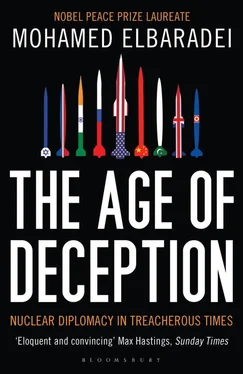The last feeble signs of progress appeared late that summer when—many years behind schedule—the first concrete was finally poured at the site of the promised light water nuclear power reactor plants, intended to become the cornerstone of a peaceful North Korean nuclear energy program. In September, Japanese prime minister Junichiro Koizumi was received by Kim Jong Il in Pyongyang—a diplomatic breakthrough—and the two countries announced their intention to normalize relations. [5] Japan-DPRK Pyongyang Declaration, September 17, 2002.
Then everything changed. The trigger was a report to Washington by U.S. assistant secretary of state for East Asian and Pacific affairs James Kelly regarding a recent meeting with North Korean officials. To this day, the details of that meeting are murky, but it appears that Kelly accused the North Koreans of running a secret uranium enrichment program. What Kelly reported was that his North Korean counterpart had admitted to the program’s existence; however, no details were given at the time regarding its nature or scope.
The United States called for inspections of this alleged enrichment program. The news was leaked to the press: immediately, media accounts appeared declaring that North Korea had cheated on the Agreed Framework. Rather than continuing the dialogue to get to the bottom of these “revelations” and address them within the Agreed Framework, the United States persuaded the executive board of the Korean Peninsula Energy Development Organization, or KEDO, the organization formed to implement the provisions of the Agreed Framework, to suspend its deliveries of heavy fuel oil to North Korea. [6] KEDO was founded in 1995 by the United States, South Korea, and Japan, to implement the principal energy provisions of the Agreed Framework, including the construction of the two promised light water nuclear power reactors. Until the reactors were completed, North Korea was to be provided with five hundred thousand metric tons of heavy fuel oil annually. As I have noted, North Korea was already complaining of a lack of good faith on the part of the United States and KEDO, because of delays in the light water reactor construction. The suspension of fuel oil shipments was the proverbial last straw.
The oil shipments, North Korea’s energy lifeline, were brought to an abrupt halt.
Pyongyang responded forcefully, declaring the Agreed Framework dead—because of the U.S. interruption of oil supplies—and announcing that it would restart the Yongbyon reactor. North Korea threatened to expel the IAEA inspectors, resume operations to reprocess its spent fuel, and withdraw from the NPT.
This was no bluff. The next day, Pyongyang officially asked the IAEA to remove its seals and surveillance equipment from the Yongbyon facilities. For a few days, we exchanged messages with our North Korean counterparts. It was Christmastime, and I was operating from a beach resort in Colombo, Sri Lanka, where my family was on holiday. I gave phone interviews to CNN from our hotel room, using my son, Mostafa, as an assistant. I kept the IAEA Board of Governors informed of the deteriorating situation. Coordinating with my team in Vienna, we tried every argument we could think of to dissuade Pyongyang from rash action.
On December 26, I made a statement condemning these actions because of the “serious proliferation concerns” they raised and criticizing North Korea for its “nuclear brinksmanship.” But no one was backing down. The director general of North Korea’s General Department of Atomic Energy, Ri Je Son, requested formally that we remove our inspectors immediately. We had no choice but to bring them back to Vienna.
In an emergency session, the IAEA Board adopted a resolution deploring North Korea’s unilateral actions and calling for reinstatement of IAEA measures. Four days later, on January 10, 2003, North Korea announced its withdrawal from the NPT. Within weeks, North Korean technicians began removing and disabling the IAEA monitoring equipment. They initiated repairs to restart the reactor, began moving fuel rods, and took steps to resume reprocessing spent fuel.
I publicly urged Pyongyang to reverse its decision, saying it was counterproductive to the efforts to achieve peace and stability in the Korean Peninsula. In fact, cabinet-level officials from North and South Korea met later in the month, looking for some sort of diplomatic way out. But it was clear that the damage had been done, at least for the time being
The hard-liners in the United States were clearly pleased that rapprochement with North Korea was brought to a halt. To them, the very idea of engaging with Kim Jong Il’s regime was repugnant. Nor were they fond of the Agreed Framework, which they characterized as rewarding North Korea for its violation of the NPT. While the Agreed Framework was indeed a flawed arrangement, the alternative would turn out to be much worse.
Of course, the IAEA Board referred the situation to the Security Council, but the council took no action. Granted, its attention, like that of the rest of the world, was strongly focused on the catastrophe taking shape a continent away in Iraq. But the real reason was China, a veto-wielding member of the P-5, whose view held sway. China stuck to its customary, and justifiable, belief that the only way to resolve the North Korean crisis or similar issues was through negotiations and dialogue. Thus, in April 2003, Beijing hosted direct talks between the United States and North Korea, but the parties made little progress, attempts at closed-door diplomacy giving way to demands, public accusations, and rejected offers.
Soon after, North Korea announced the end of its last remaining non-proliferation pact: a 1992 bilateral agreement with South Korea to keep the peninsula free of nuclear weapons. Undeterred, China continued to press for a diplomatic resolution, hosting the first of what would be dubbed the “six-nation” or “six-party” talks: a long-running series of negotiations that, in addition to North Korea and the United States, would include Japan, Russia, and South Korea.
The IAEA was given no role in the six-party talks. Indeed, in every practical sense, the years that followed North Korea’s 2003 exit from the NPT were, from the IAEA’s perspective, a black box. We were kept in the dark. We had no inspection presence in North Korea. While I supported the efforts to engage the North Koreans in dialogue through the six-party talks, the lack of a unified and consistent international response to the North Korean escalation was, in my view, setting a dangerous precedent. On the one hand, in the case of Iraq, the government had invited in the international weapons inspectors who had found no evidence of continuing WMD programs, yet the inspection findings had been put to one side in favor of an invasion (allegedly based on a “threat to international peace and security”). On the other hand, North Korea’s government had failed to answer questions about concealed plutonium, secret facilities, and its alleged undeclared enrichment program; Agency inspectors had been sent out of the country; and the North Koreans had withdrawn from the NPT—sending a strong signal regarding their intentions—yet there was no collective condemnation by the Security Council, and the IAEA, the body charged with preventing nuclear proliferation, was not even part of ongoing talks. [7] Since withdrawal from the NPT takes three months to go into effect, North Korea’s decision became official on April 10, 2003. Although the IAEA Board had referred the matter to the Security Council for action, the council did not issue a resolution on the matter; following its closed-door meeting on April 9, council president Adolfo Aguilar Zinser of Mexico merely told reporters that council members had “expressed their concern” and would continue to follow up on developments.
Читать дальше












